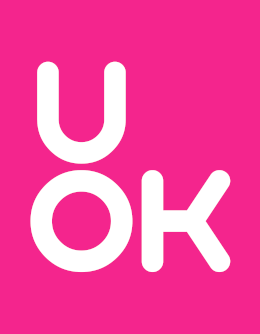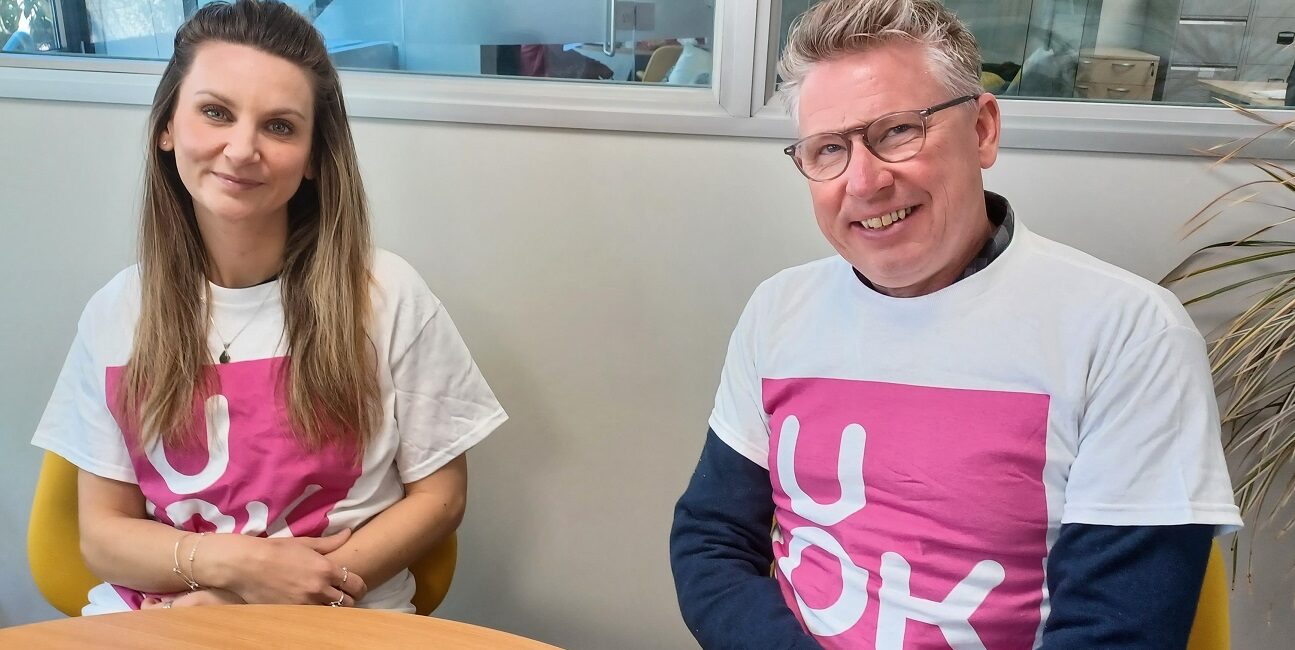Southdown’s Communications Manager, Alice, sat down with Brooke Joyce (Partnership Lead for UOK Brighton & Hove) and Stuart Reid (Partnership Lead for UOK East Sussex) to find out more about their roles and the UOK network of mental health support.
Alice: Welcome to Southdown! Since you both recently joined us – Brooke in September last year and Stuart in April – we’d love to get to know you better and learn more about your roles. To kick-off, could you please share a bit about what you’ve been up to work wise prior to joining Southdown?
Brooke: I started off in advertising, working for an advertising agency. I then decided I wanted to have some fun while I was still young, so went to work abroad for three years on ski and summer seasons, which was great. When I came back, I worked in advertising account management for a publishing company before going to live in Australia for two years, working in marketing over there. When I came back to settle in the UK, I realised I wanted a job with more purpose, so I volunteered for a children’s charity which made me realise I’d love to work for a charity/ not-for-profit full time. For the past three and a half years, prior to Southdown, I worked for a national children’s charity in their Corporate Partnerships team.
Stuart: I started as a sales rep in the building industry but while I was doing that I volunteered at a homelessness hostel. It was then that I realised, similar to Brooke, that what I was doing in my day job didn’t fulfil me and that I could do something that I’m passionate about and get paid for it.
So, I got a job at a night shelter for about three years. Then I did a couple of years working in resettlement, supporting people to get off the streets and into hostel accommodation, followed by hostel management. It was there that I began to see that mental health thread running through all the work that I was doing, and that it was an area I found really rewarding. So, I went to work for a local Mind as a service manager which led to being the Head of Community Services at Oxfordshire Mind and working at national Mind on UK-wide community mental health programmes.
Alice: What attracted you to join Southdown as Partnership Leads for UOK?
Brooke: I really wanted a job working in my local community. I moved down to Brighton and realised that I wasn’t feeling as connected to my current work as I previously had. When I saw Southdown, I felt like our values matched. Being one of the biggest not-for-profits in Sussex was also really appealing to me, as well as the role of Partnership Lead for UOK because of the varied responsibilities and opportunity to build strong relationships.
Stuart: After relocating to East Sussex with my family, Southdown crept into my subconscious as I was looking for a role where I could engage with my new local community. I saw Southdown around and after looking at your website couldn’t believe it when I saw the Partnership Lead job because of the synergies with my experience and what I’m passionate about. It was an amazing opportunity to come in at the beginning of the new UOK East Sussex contract and to join an organisation with such a great reputation.
Alice: Can you tell us a little about the Partnership Lead roles?
Brooke: I manage the UOK Brighton & Hove contract, including performance, relationships with subcontractors, reporting and procurement. When I first joined, I was looking at the strategic direction for UOK Brighton & Hove; looking at the needs of local people living in the city and how local providers, the NHS and the Council work collaboratively to meet those needs. I support bringing the partnership together, so everyone is working in a connected way towards the common goal of making sure people get the mental health and wellbeing support they need at the right time. I also work closely with the Communications team to ensure we are promoting UOK in the best way possible, and I am involved with delivering the Community Mental Health Transformation Programme in the city.
Stuart: My immediate priority is to really understand what’s out there locally in East Sussex, to immerse myself in the services and to meet the teams providing them. In addition, as part of the Community Mental Health Transformation Programme, alongside Brooke, I’m working collaboratively with partners to ensure development of the UOK network is aligned and joined up with sector-wide insight and thinking. By seeing how everything maps together, we’ll be able to see where the opportunities are as well as where the gaps are to provide accessible mental health support for all. I’m also keen to learn from Brooke’s experience and how the UOK partnership in Brighton & Hove has developed over the past five years.
Brooke: I echo what Stuart says. It’s great having someone else to work alongside, share ideas and learn from to continually develop the UOK mental health network across Brighton & Hove and East Sussex.
Alice: You talk about partnership working being key to the UOK network. Can you share a little bit more about this…
Brooke: Everyone has something to learn of everyone they meet. And in a partnership, it should always be about how can I help you, how can you help me, and how can we all work together to achieve what is needed for the people we support.
In the UOK Brighton & Hove partnership, it’s really inspiring to see all these different services who support different areas of the community coming together and sharing knowledge and understanding.
Stuart: No one organisation or body can meet all the need that is in our communities. So, we have to work together and collaboratively if we want to be there for people. Across Sussex, it’s exciting to see real appetite and commitment to doing this and to build our collective strength to make sure that when anybody experiences a mental health problem that they can easily access support, information and advice in the right place, at the right time.
Alice: You’ve both shared how you were keen to develop a career to support social good. Can you share why mental health, in particular, means a lot to you?
Brooke: I grew up with parents who suffered from mental health conditions. My mum has Biopolar disorder and my Dad went through a period of severe depression. It was tough at times and has made me realise how much children and young people can go through living with their parents’ mental health challenges.
My personal experience has directly impacted on my career choices as I’ve sought out opportunities to support good mental health. There’s also a big thing for me around removing stigma. My mum didn’t want to seek mental health support because of the stigma (Biopolar was formerly called Manic Depression). We’ve come a long way but there is still a lot of work to be done.
Stuart: How can you not be passionate about something that affects so many of us, whether directly or indirectly? Throughout my career, working in homelessness and mental health, I’ve seen the devastating effect poor mental health can have. There’s a lot of unmet need but as time’s gone on, over the past 25 years, fortunately, we’ve completely changed the way we talk and think about mental health. Prevalence though is still as huge as ever which is why I continue to be motivated and inspired to play my part.



